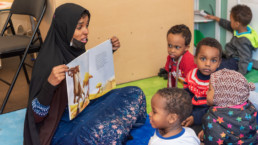Voices of Tomorrow is a premiere, contemporary bilingual and bicultural preschool program situated in the Pacific Northwest. We strive to cultivate the identity of the African child.
adult education programs

Trauma-Informed Care (TIC)
This trauma competency training revolutionizes the way Early Learning staff work with trauma survivors and dramatically improves the quality of the program.
In this series, we will explore the history and evolution of traumatic stress, grief and loss, Core competencies of teaching students with trauma, assessments of traumatic stress disorders, treatments and intervention resources available, and creating program policy and procedures in line with trauma-informed practices.

Dual-Language Early Learning
This training series explores innovative ways to support and educate children who are dual-language learners and their families.
The 5-session series will cover program development and structure, instructional teaching practices, assessing dual-language students, and providing family engagement that is culturally and linguistically responsive.
Upon completion, participants will be able to:
- Discuss dual language program components
- Explain the importance of encouraging young children to celebrate their uniqueness
- Describe how young children learn using hands-on discovery methods rather than passive learning
- Consider and choose appropriate tools for dual-language learning activities.

Childcare Basics Training
The Child Care Basics course is designed to prepare early learning professionals caring for children to be knowledgeable of child development, resourceful in planning activities, skilled in guiding behavior, and able to maintain healthy environments. Child Care Basics uses the Washington State Core Competencies for Early Care and Education Professionals as its foundation.
Interactive learning activities, video clips, discussion questions, and additional resources provide a variety of learning opportunities. The curriculum is designed to meet the needs and licensing requirements of both child care center staff and family home child care providers.

Family Centered Advocacy and Program (FCAP)
Family advocacy program from cohort facilitation training and group workshops to individual parent leader model. FCAP aims to meet parents where they are and provide the education, training, and resources to boost them as individuals and cultivate a structure that scaffolds collective action.
The Program intends to help bridge the gap between school and home by supporting families in building advocacy skills and knowledge base in how to support their child’s individual developmental needs and develop tactics for managing stress and identify barriers. The program is designed to acknowledge and empower parents that are navigating an overwhelming set of challenges.

Enhancing Quality of Early Learning (EQEL)
This training for child care providers deepens knowledge on best practices regarding quality environments and early learning and builds on concepts introduced in Child Care Basics.
Learning Objectives:
Upon completion, participants will be able to:
- Describe how personal values, culture, and biases impact our interactions and teaching practice. Define trauma and its effects on children, families, and programs.
- Identify specific culturally responsive and sustaining practices.
- Describe how experiences build brain architecture
- Define 3 executive functioning skills
- Identify specific strategies to support brain building and promote executive functioning for self and children

Helping Children - Social Emotional Skills (SEL)
This training is designed to promote the social-emotional development and well-being of young children in licensed child care settings throughout Washington state. It is meant to help strengthen relationships among child care providers, staff, children, and families, and gives them a chance to ask questions regarding challenging behaviors or social-emotional well-being.

Prenatal & Infant Mental Health (IMH)
The Prenatal and Infant Mental Health training is designed for providers and child care staff who would like to improve or implement prenatal and infant mental health programming. This training provides staff with a foundation of the spectrum of mood and anxiety disorders which impact parents, children, the family, and their community. Topics also include managing medications and needs during pregnancy and providing mental health support during pregnancy and after birth.